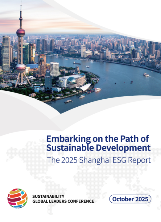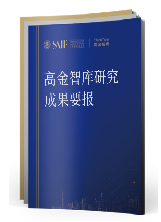5th Floor, West Tower, World Financial Centre
1 Dong San Huan Middle Road
Chaoyang District, Beijing 100020, China
Tel: +86 10 5081 5880
Accomplishments
SAIF ThinkTank, as the research platform of SAIF, focused on overarching, forward-looking, and strategic matters integral to Shanghai becoming an international financial center, SAIF ThinkTank conducts pivotal research projects across core areas like sci-tech innovation finance, sustainable finance, and digital finance. High-caliber research reports and policy recommendations are now produced on a consistent basis.


![]() [SAIF ThinkTank Key Report] Issue 18 - Incorporating the “Micro Connect” Financing Model into Financial Regulation
[SAIF ThinkTank Key Report] Issue 18 - Incorporating the “Micro Connect” Financing Model into Financial Regulation
Since 2021, SAIF ThinkTank has undertaken 60 major projects and produced 51 decision consultation reports. These are commissioned by the CPC Municipal Committee, Municipal Government, Municipal Financial Bureau, Municipal Development and Reform Commission, Municipal Education Commission, and Financial and Economic Committee of the Municipal People's Congress of Shanghai.
By targeting key areas in China's financial development and Shanghai's growth as an international financial center, SAIF ThinkTank plays a vital role in policy research and decision-making support.
For example, findings from a special study revising the Shanghai Regulations on Advancing International Financial Center Construction have directly informed new local laws and regulations, providing critical legislative research support.
While undertaking government-assigned research tasks, SAIF ThinkTank also fully utilizes its existing academic foundation and advantages in financial disciplines. It organizes interdisciplinary and cross-institutional joint research centered on overarching, forward-looking, and strategic issues integral to Shanghai's growth as an international financial center, and critical areas including sci-tech innovation finance, sustainable finance, and digital finance.
In order to swiftly establish its influence, SAIF ThinkTank independently and collaboratively conducts two categories of pivotal research projects: annual series of reports that highlight the think tank's areas of expertise and are published on an ongoing basis, as well as substantive thematic research reports that closely monitor and analyze emerging trends across global economic and financial spheres.

211 West Huaihai Road
Shanghai 200030, China
Tel: +86 21 6293 3500
9th Floor, Building T6, Hongqiao Hui
990 Shenchang Road
Shanghai 201106, China
3rd Floor, Building D, Chenfeng Building
800 Tongpu Road
Shanghai 200062, China
5th Floor, West Tower, World Financial Centre
1 Dong San Huan Middle Road
Chaoyang District, Beijing 100020, China
Tel: +86 10 5081 5880
1203 Tower 7, One Shenzhen Bay
Nanshan District, Shenzhen 518000, China
Tel: +86 755 8663 8815
© Shanghai Advanced Institute of Finance All Rights Reserved.


Top